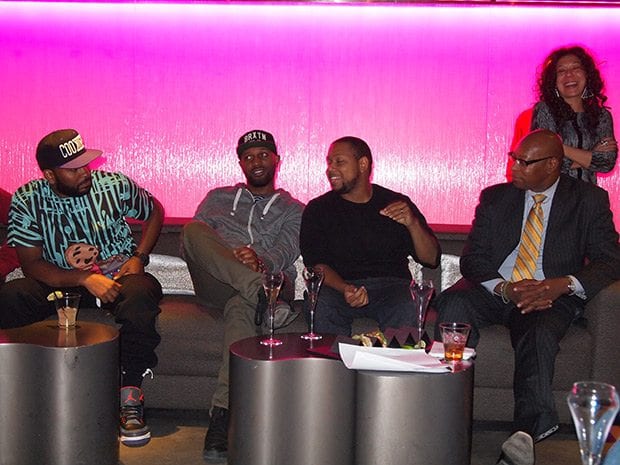
Yawu Miller
Boston has long had a reputation as a city unwelcoming to black professionals, but a new cadre of entrepreneurs is looking to change that. At a panel discussion in the Emerald Lounge in the Theatre District, seven business-owners shared their success stories with an audience of 60 people and painted a picture of a city full of opportunity.
Leandrew Robinson’s first business venture — a restaurant — was not a bricks-and-mortar establishment, but rather an imaginary business of the kind that an eight-year-old boy with free time on his hands would dream up.
“I’ve always wanted to run some type of business,” he said.
As Robinson grew older, his businesses became more real, and profitable as well. He still doesn’t have a bricks-and-mortar business, but in the age of the Internet, that hasn’t stopped him from grossing $50 million in sales with a start-up clothing retail site.
Robinson’s entre into business began with a T-shirt company he founded while a student at University of California Berkley. His big break came when he met with Greg Selkoe, whose Karmaloop website specializes in the so-called streetwear segment of the clothing market. Selkoe offered him a job running PLNDR, a website that specializes in flash sales —limited-time offers where clothing goes on sale at steep discounts.
“By that time, I was so hungry, I gave it all I had,” Robinson said. “We grew from a website to me and 35 people.”
Like others on the panel, Daniel Cordon showed entrepreneurial success early in life.
“I was that crazy kid who was subcontracting out my paper route at age eight,” he said.
But his life took an unfortunate turn when in 1995, he was incarcerated. When released, he went to work at Haley House, the Dudley Square restaurant and catering business. He quickly became the catering manager there, helping grow the business to a $350,000 a year operation.
Now he’s co-owner of the Boston Brewin company, an organic coffee venture he hopes to grow into a regional chain that competes with corporate chains while paying a living wage and keeping profits in the communities they serve.
“We’re trying to take down Starbucks,” Cordon said. “We’re trying to take down Dunkin’ Donuts and we want to give the shops to the community. Corporations take money out of the community and don’t pay a living wage.”
The entrepreneurs on the panel shared their success stories and insights into the challenges of operating businesses in Boston. Darryl Settles, a real estate developer and owner of Darryl’s Corner Bar & Kitchen, a South End restaurant, said black business owners are now more isolated than when he first went into business in the late 1980s.
“We have fewer minority-owned businesses than we had 25 years ago,” he said. “You’re doing great stuff. We need to know you’re here.”
Robinson acknowledges the hindrances that racism puts on black entrepreneurs, but said the experience of creating a business in a hostile environment can hone entrepreneurial skills.
“Racism is an amazing teaching tool for an entrepreneur,” he said. “I’m used to hearing no and taking a different route. In entrepreneurship you’re constantly taking a different route.”
Robinson said he put his obstinance to use in recruiting companies to sell their clothes on PLNDR at steep discounts.
“They say they’d rather burn their stuff than sell it a half price,” he said. “Although they’re saying ‘hell no,’ I hear them saying ‘later.’ You’re a little tougher than most folks. Embrace it. It’s good.”
Selkoe, whose organization hosted the panel discussion, has made it a crusade to change the business climate in Boston. He founded Future Boston Alliance, an advocacy group aimed at making Boston friendlier to young adults and the creative class. He made waves last year with a video lampooning outgoing Mayor Thomas Menino for being resistant to change.
“It’s really an effort to bring Boston into the 21st century,” he said. “When I’ve had opportunities to recruit talented black men, a lot of them have said they won’t come to Boston.”
Settles said the changing of the guard in the mayor’s office presents a new opportunity for blacks in business to create a more welcoming atmosphere.
“We have an opportunity with the new mayor,” he said. “He is under a lot of pressure to change the environment. Now, within the next six months is the right time to make that ask.”







